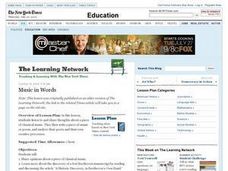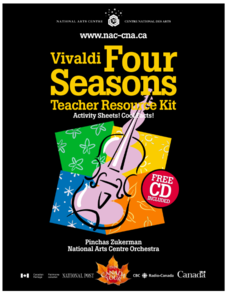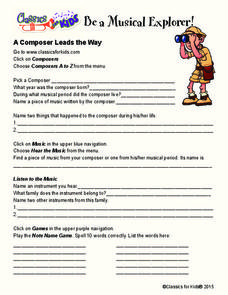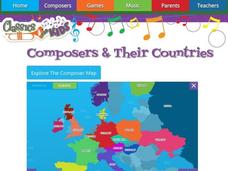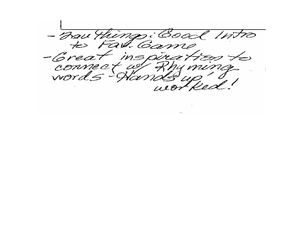Curated OER
Look in the Mythic Mirror: I've Got Rhythm!
Learners explore the relationships between music, poetry, and visual art. Using the story of Orpheus and Eurydice, pupils develop an awareness of the compositional elements of the Classical style, and the aesthetic effects of those...
Curated OER
Music in Words
Your class can build strong, well-represented opinions about the music they hear. They listen to, and share thoughts about, a piece of classical music. Then they write a piece of music or a poem, and analyze their peers' work and their...
Canada's National Arts Center
Vivaldi and The Four Seasons
Did you know that Vivaldi’s orchestra was largely made up of girls from an orphanage? Fun facts like this fill a 34-page teacher's kit designed to accompany a cross-curricular study of Vivaldi's The Four Seasons.
Canada's National Arts Center
Vivaldi and The Four Seasons: Teacher Resource Kit
Did you know that Vivaldi wrote "Winter," the final concerto of his The Four Seasons, in the key of F minor to echo the sleigh ride pieces popular at the time? A teacher resource kit, designed to support a study of the work, is packed...
Boston Symphony Orchestra
The Elements of Music—How do Composers Plan?
The introduction to Tchaikovsky's Swan Lake and the finale of his Symphony No. 4 provide young musicians with an opportunity to investigate the music elements composers employ to develop the themes they want to create. They compare the...
Classics for Kids
Instrumental Sounds
What sound does a piccolo make? What's the difference between a violin and viola? What family does a timpani belong to? Take a tour through the different sections of an orchestra with an interactive reference tool.
Hookshot Creative
Compose Your Own Music
Channel the masters with an interactive music composition activity! Learners use the online tool to create their own masterpieces one measure at a time.
Classics for Kids
Musical Time Travel
Young musicians learn more about the greats with a straightforward activity on historical composers. As they click through a navigation guide, they choose a musical time period and a composer from that period before taking a short quiz.
Classics for Kids
Hurry Up – Slow Down
Is your music appreciation class feeling a bit adagio this afternoon? Pick up the pace and get them feeling andante with a straightforward music theory activity. After defining several terms for musical dynamics and musical tempos,...
Classics for Kids
Fun With Musical Words
Is concertmaster another term for conductor, or is he or she another person entirely? Learn the specifics of the role of concertmaster with an activity focused on classical music. After learners define the term, they select a piece of...
Classics for Kids
Listen to the Music
Different pieces of music can elicit different emotions from audience members. A quick tempo can make you feel happy, while a largo piece may bring out a melancholy temperament. Elementary musicians learn more about the instruments and...
Classics for Kids
A Composer Leads the Way
What song is playing? A music activity focuses on composers throughout history, their famous works, and the instruments in each piece. As pupils complete the learning exercise they play a short game to review music theory terms.
Classics for Kids
Instruments Have a Family
Are the instruments in Bach's Brandenburg Concerto No. 2 in the same family as those in George Gershwin's Rhapsody in Blue? Elementary musicians work on their music theory and their instrumental ear as they listen to clips of famous...
Classics for Kids
Composers Timeline
Take a quick tour through the last 350 years of music composition with an interactive timeline tool. As learners scroll through the years, they see which composers were born and working during the Baroque, Classical, Romantic, and Modern...
Classics for Kids
Composers and Their Countries
How many of the world's greatest composers were born in Austria? Or Germany? Or the United States? An interactive map provides young musicians with information about prominent composers in the last few centuries, as well as the periods...
Classics for Kids
"Mars" from The Planets
Gustav Holst's The Planets provide young musicians an opportunity to examine how composers can create a suite: a collection of smaller pieces grouped to explore a single topic. After listening to "Jupiter," they examine "Mars" in detail,...
Curated OER
Creating an Original Opera
This may be a lot to ask of a high schooler, but then again, who knows? Pupils work in groups to explore, write, and then perform an original opera. They view versions of The Magic Flute and La Traviata, then compose a plot, characters,...
Curated OER
GCSE Notes 2000: Classical Music
Classical period music is defined by its characteristics and distinctive sound. A set of notes assists upper graders in recalling and analyzing music from the classical period based on musical terminology. An example analysis of Eine...
Curated OER
Peter and the Wolf
Peter and the Wolf is a wonderful piece that introduces learners to classical music, builds listening skills, and creates a bridge from song to imagination. Each slide shows a picture of one of the characters from the story and a group...
Curated OER
The Sorcerer's Apprentice: 200 Greatest Pop Culture Icons
Upper graders view the animated short, "The Sorcerer's Apprentice" and analyze how the music score was chosen to express the scene. They create an animation as they listen to a classical recording to experience the connection between...
Curated OER
Ballet and Classical Music
Fourth graders explore ballet. In this dance and music humanities lesson, 4th graders practice ballet positions and play a card game using French ballet vocabulary. Students count beats in rhythm patterns and listen to classical music...
Curated OER
Danse Macabre: Saint-Saëns
Assist your youngsters as they learn to visualize the story music can tell us. They listen to the piece "Danse Macabre" while viewing this slideshow. Each slide describes the key instrument and what creature of the dark it represents. A...
Curated OER
The Enlightenment Spreads: CH 22
Explore the Enlightenment period through literature, music, and autocratic rule. Each slide contains basic information on major Baroque, Classical, and political figures contemporary to the late 1700's and early 1800's. Vivaldi, Bach,...
Curated OER
Classroom Builder
Students explore music theory by discussing a classic song. In this musical notation instructional activity, students listen to the song "My Favorite Things" and discuss and share their personal tastes with the class. Students practice...



